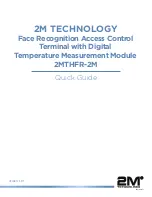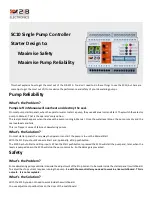
10
cdvi.com
cdvigroup.com
DGLIEWLC
Flush mount Stainless steel Proximity Card Readers - Wiegand
INSTALLATION MANUAL
EN
30-bit Wiegand Output
Signals output in open collectors with pull up in 30-bit hexadecimal format. The output format from the
proximity reader is 30-bit wiegand (Signal: DATA1, DATA0 and CLOCK) and is structured as follow:
1 - First parity : 1 bit – even parity for the first 14-bit
Code : A code is formed from 7 half byte.
Each byte is transferred from bit 7 to bit 0.
2 - Second parity:
1 bit – odd parity for the last 14-bit
Bit 1
Bit 2 à bit 29
Bit 30
Even Parity from bit 2 to bit 15
Data (28-bit)
Odd Parity from bit 16 to bit 29
Example A : Temic card decimal code: 689905 (in hexadecimal: A86F1).
1
0000
0000
1010
0110
0110
1111
0001
0
Parity 1
0
0
A
8
6
F
1
Parity 2
The code number of the card is 00A86F1 in hexadecimal
Example B : EM badge hexadecimal code: 0100166A37
1
0000
0000
0001
0001
0110
1011
0110
1
Parity 1
0
0
6
6
A
3
7
Parity 2
The code transmitted is in hexadecimal format 0166A37
Parity 1 :
0 if the number of 1 in bit 2 to bit 15 is even
1 if the number of 1 in bit 2 to bit 15 is odd
Parity 2 :
0 if the number of 1 in bit 16 to bit 29 is odd
1 if the number of 1 in bit 16 to bit 29 is even.
44- bit Wiegand Format Output
44-bit hexadecimal format. The output format from the proximity reader is 44-bit (Signal: DATA1, DATA0
and CLOCK) and is structured as follow:
1 - Data: 10 digit code number hexadecimal MSByte first . Each hexadecimal digit = 4 bit, MSBit first
2 - LRC : 4 bit = or restricted in between the digit of the data, MSBit first.
Bit 1 à bit 40
Bit 41 à bit 44
Data MSBit first
LRC
Example A : EM badge hexadecimal code: 01001950C3.
0000
0000
0000
0000
0001
1001
0101
0000
1100
0011
0011
0
1
0
0
1
9
5
0
C
3
3
The code number of the card is: 01001950C3 in hexadecimal code.






























